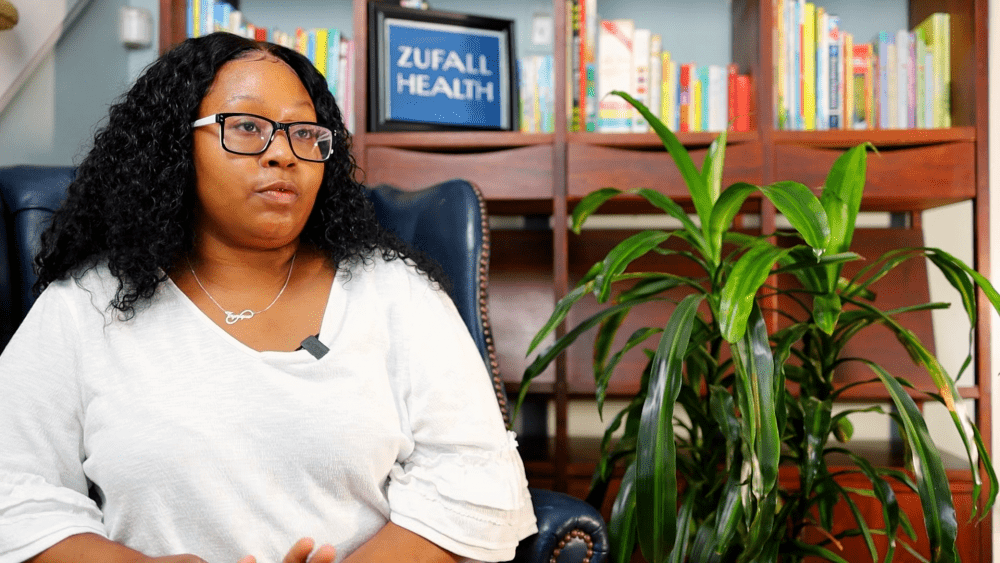

Zufall Health Examines New Jersey’s Black Maternal Health Crisis in New Video
In New Jersey, the maternal mortality rate – a measure of how many women die during pregnancy or up to one year after giving birth – is one of the highest in the U.S., with Black women affected more than women of other races. A Black mother in New Jersey is seven times more likely than a white mother to die from maternity-related complications.
During Black Maternal Health Week (BMHW), April 11 – 17, Zufall Health is calling attention to Black maternal inequity in our state in a new short video. BMHW is recognized annually by the Black Mamas Matter Alliance, an organization that advocates, drives research, builds power, and shifts culture for Black maternal health, rights, and justice. Created by Zufall’s Outreach Department, the video interviews two physicians and two Zufall Prenatal Services patients, all of whom are Black women.
Systemic inequality and racial biases are leading causes of maternal health disparities. Judy L. Banks, M.D., an obstetrician-gynecologist with Atlantic Health System, says “there is nothing about race itself” that makes a Black mother more likely to die than a non-Black peer. Rather, Black mothers’ lives are jeopardized by the social determinants of health – factors like housing, food access, and transportation – and by health care providers’ unconscious racial biases. There is a narrative that Black women are unhealthy or irresponsible, explains Nastassia Davis, DNP, MSN, RN IBCLC, Founding President of the Perinatal Health Equity Foundation, Assistant Professor of Nursing at Montclair State University, and CEO and Founder of LATCH Breastfeeding and Lactation Support. As a result, health care providers are more likely to dismiss Black mothers’ concerns.
To make matters worse, there are no standards of care in New Jersey to address post-partum hemorrhage and preeclampsia, two of the most common maternity-related complications. In states like California, where maternal mortality is the lowest in the U.S., hospitals have adopted protocols to reduce the occurrence of these conditions. In the absence of such standards, it is vital that patients and their families understand the postpartum warning signs, like chest pain, seizures, thoughts of self-harm, heavy bleeding, and swollen legs, and voice their concerns promptly and confidently. In turn, this life-or-death communication requires health care providers to empower Black women to speak up. “[Providers] need to make [maternity patients] feel as though [they] can ask them questions,” says video speaker Wilhelmina Allen, a Zufall patient.
Michelle Blanchfield, MPH, Zufall’s Director of Outreach and Special Populations, urges providers across the state to evaluate how they are providing prenatal and postpartum care to Black women considering this public health emergency. Until New Jersey adopts formal protocols like those in California, please help us raise awareness so that we can, in the words of Banks, “help restore childbirth to a position of being one of the happiest times in [one’s] life” for everyone, regardless of race or ethnicity.
Watch and share our video to learn more and help educate others. Additional resources for patients, allies, and health care providers are available below.
For patients
- Urgent Maternal Warning Signs (CDC)
- Signos de una urgencia en la madre durante el embarazo o posparto (CDC)
- Save Your Life: Get Care for These Post-Birth Warning Signs (Association of Women’s Health, Obstetric, and Neonatal Nurses)
- Salve Su Vida: Busque atención médica para estas señales de advertencia después del parto (Association of Women’s Health, Obstetric, and Neonatal Nurses)
- A Guide to Help You Start the Conversation with Your Health Care Provider (CDC)
- Una guía que le ayudará a comenzar una conversación con su proveedor de atención médica (CDC)
For allies
- Partners, Friends, and Family of Pregnant or Postpartum Women (CDC)
- Parejas, amigos y familiares de mujeres embarazadas o en etapa de posparto (CDC)
- Film: Black Birth (Directed by Haimy Assefa)
- Nine Action Areas and Recommendations (Nurture NJ)
For providers
- Eliminating Preventable Maternal Mortality and Morbidity (American College of Obstetricians and Gynecologists)
- Post Birth Warning Signs Education Program (Association of Women’s Health, Obstetric, and Neonatal Nurses)
- Maternal Early Warning Criteria (Alliance for Innovation on Maternal Health)
- Post-Birth Warning Signs Education Program (Association of Women’s Health, Obstetric, and Neonatal Nurses)

